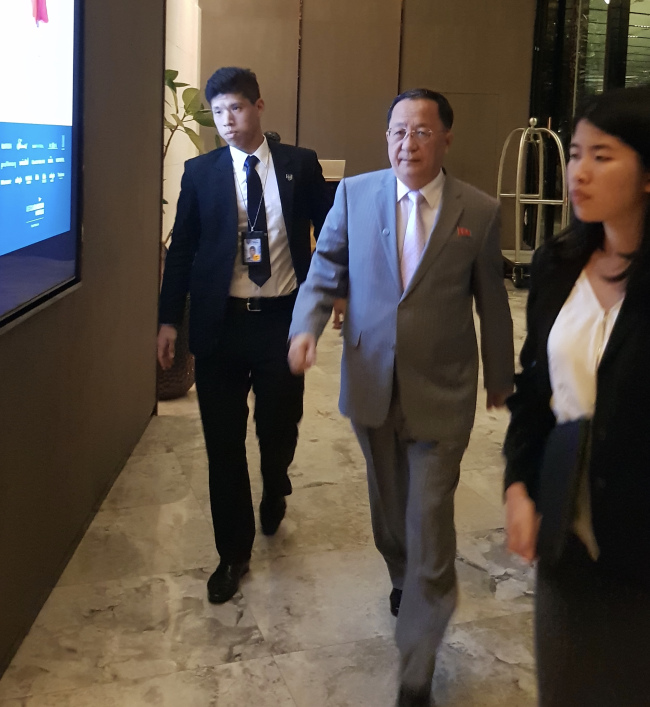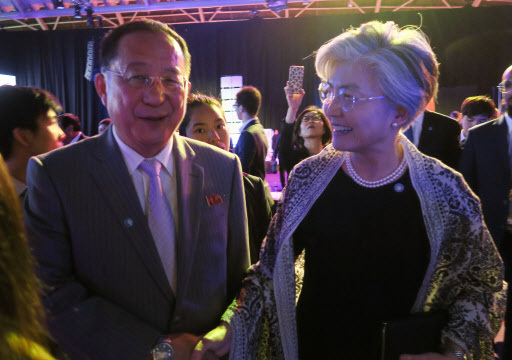North Korean Foreign Minister Ri Yong-ho turned down a request for a formal bilateral meeting with her South Korean counterpart Kang Kyung-wha on the sidelines of an annual regional forum in Singapore on Friday, a South Korean government official said.
 |
North Korean Foreign Minister Ri Yong-ho returns to his hotel in Singapore Friday night after attending bilateral talks on the sidelines of the ASEAN Regional Forum. A handful journalists, mostly Japanese, waited for Ri to arrive at his hotel. (Kim So-hyun/The Korea Herald) |
Kang encountered Ri at a working dinner at the Association of Southeast Asian Nations Regional Forum and once again suggested a bilateral meeting, but the North‘s top diplomat said it was not the right time for such talks, according to the official from Seoul’s Foreign Ministry.
“Kang and Ri met each other and exchanged considerably candid opinions on various situations in the wake of the inter-Korean summit and the US-North Korea summit,” the official told reporters on condition of anonymity without elaborating what was discussed between the two.
“A separate bilateral meeting foundered, but we had a chance to understand the other side and deliver our thoughts through contact at the working dinner,” he said.
 |
North Korean Foreign Minister Ri Yong-ho (L) and South Korean Foreign Minister Kang Kyung-wha speak at a gala dinner for a regional security forum in Singpaore on Friday. |
Amid ongoing diplomatic efforts to lead North Korea to give up its nuclear weapons program, South Korea has sought to hold an inter-Korean foreign ministerial meeting on the sidelines of the ARF, which kicked off Thursday.
Ri, who arrived in Singapore on Friday, held a bilateral meeting with his counterparts from seven countries including China, Thailand, Vietnam, Laos and Indonesia, according to Jong Song-Il, who is believed to be North Korea‘s former ambassador to Singapore.
“With China, Ri discussed matters about expanding and developing traditionally friendly bilateral relations between North Korea and China, and matters about strengthening strategic, tactical cooperation between the countries to ensure peace on the Korean Peninsula,” Jong told reporters.
Earlier in the day, Kang had a bilateral meeting with her Chinese counterpart Wang Yi.
On denuclearizing Korea, the Chinese minister said an improvement in inter-Korean relations and Pyongyang-Washington ties is expected to lead to permanent peace in the region.
Wang reaffirmed Beijing’s support for the two Koreas‘ pursuit of declaring a formal end to the Korean War.
The two Koreas hope to declare an end to the Korean War within the year as agreed at the April 27 inter-Korean summit, which they believe could be the first step toward building trust. Washington wants the North to take more concrete steps to denuclearize first.
On denuclearizing Korea, the Chinese minister said an improvement in inter-Korean relations and Pyongyang-Washington ties is expected to lead to permanent peace in the region.
At their meeting, Wang also called for South Korea’s efforts to “completely” resolve the issue of an advanced US missile defense system deployed on the peninsula.
South Korea deployed the THAAD to counter the North’s missile threats last year. China has fiercely opposed the deployment of the Terminal High Altitude Area Defense system in South Korea, viewing it as a threat to its own security. It has taken what appears to be retaliatory measures, such as a ban on the sale of package tours to South Korea.
In response, Kang expressed hope that China will make more efforts to normalize its relations with South Korea.
On Saturday, Kang is set to hold a bilateral meeting with US Secretary of State Mike Pompeo, where they are expected to reaffirm their commitment to the complete denuclearization of the Korean Peninsula. She is also to attend a meeting of top diplomats from the 26 countries and the European Union, where a joint statement will be adopted.
Led by the 10 members of the Association of Southeast Asian Nations, the ASEAN Regional Forum kicked off Thursday, bringing together key countries in the Korean Peninsula’s denuclearization efforts. It is one of the largest gatherings in the region to discuss security issues in the Asia-Pacific region. In recent years it has served as a rare venue for North Korea to interact with other countries.
By Ock Hyun-ju (
laeticia.ock@heraldcorp.com)













